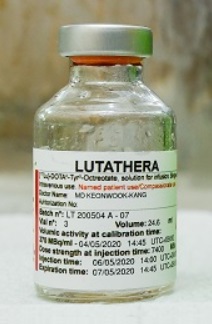The Korean regulator's restriction on the number of treatments using the radiopharmaceutical product Lutathera (lutetium oxodotreotide) has been relaxed for neuroendocrine tumor patients who have had to travel abroad for additional treatment.
Under the eased rule, the number of domestic treatments with Lutathera will increase from four reimbursed and two non-reimbursed doses to four reimbursed and four non-reimbursed doses.

According to the Health Insurance Review and Assessment Service (HIRA), the number of uncovered treatments using Lutathera has been changed from two to four. Thus, patients with neuroendocrine tumors will be able to receive eight treatments of Novartis' Lutathera in Korea from June through the “approval system for non-reimbursed use of drugs exceeding the scope of approval or report.”
The new rule also relaxed the requirement to re-dose Lutathera from 18 months to six months after the last dose of the previous treatment and changed the dosing phase from the third and fourth treatment to the second and later treatment, HIRA said.
However, the reality of Korean neuroendocrine tumor patients having to travel for overseas treatment has not changed completely.
That’s because the off-label use authorization system is based on medical evidence. Still, the updated global literature on ruthenium therapy includes up to eight treatment cycles of efficacy and safety profiles.
Unlike clinical trials for other anticancer drugs, clinical trials for radiopharmaceuticals, including Lutathera, are minimal until a therapeutic benefit is demonstrated. Also, unlike other anticancer drugs, radiopharmaceuticals are expensive to produce and require high transportation costs due to the short half-life of the isotopes, resulting in a cost of about 10 million won ($7,267) per treatment in clinical studies.
For this reason, unlike other anticancer drugs, pharmaceutical companies are required to conduct clinical studies of radiopharmaceuticals with a minimum number of treatments to demonstrate the drug's effectiveness. This also explains why Lutathera's global marketing authorization is for “four treatments every eight weeks.”
It is common knowledge in nuclear medicine treatment that all pharmaceutical companies are unwilling to conduct further clinical studies on radiopharmaceuticals. That's because even if this “minimum treatment” produces meaningful clinical trial data, other countries except Korea do not restrict the use of the drug by limiting the number of treatments out of respect for the opinions of medical experts.
“Although neuroendocrine tumor patients cannot be 100 percent satisfied, we are content that we have taken a step forward and will continue to make efforts to increase the number of opportunities for patients to receive treatment in Korea,” said Jin Mi-hyang, head of the Korean Neuroendocrine Tumor Patients Association.
Related articles
- Government considers expanding treatment options for Korean neuroendocrine tumor patients
- Why are there radiotherapy limits for neuroendocrine tumors if there aren't any for thyroid cancer?
- Cancer patient group blasts Seoul for limiting treatment opportunities at home
- Neuroendocrine tumor patients petition to lift Lutathera treatment restrictions
- 'Alzheimer’s drug Leqembi to boost demand for DuChemBio’s radiopharmaceuticals'

